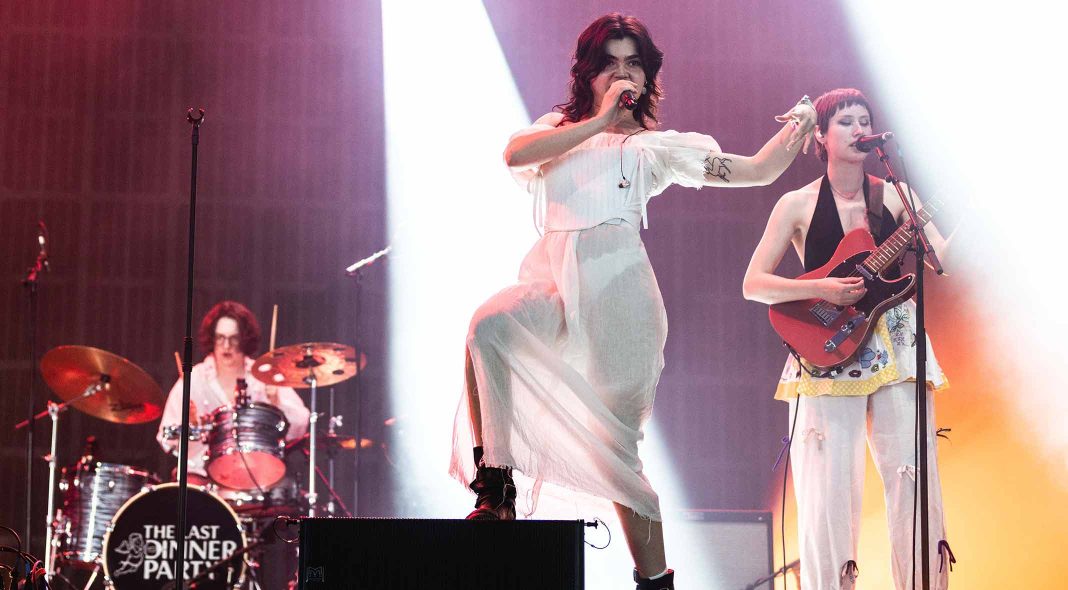Forget Christmas — it’s already awards season, baby! Hot on the heels of the 2024 Grammys longlist announcement, the BRIT Awards have dropped their nods for their Rising Star award, introduced in 2008 as a glowing prediction of the new act most likely to dominate the year ahead.
Won in 2023 by girl group sensation FLO, the list (and ultimate winners) has tended to favour women in the last few years, and in some ways 2024 is no different. And yet, with a male nominee, a “romantic, grotesque and gothic” rock group and a pop singer intent on saying exactly how she feels about modern dating, noticeable shifts are afoot…
First up on the potential podium is Southampton-born Caity Baser, best known for upbeat, poppy songwriting that explores the many ‘Am I right ladies?’ moments that come with navigating your Gen Z twenties. Reflecting on the perils of catching feelings in a messy situationship, 2022 banger ‘Friendly Sex’, was her breakthrough moment, but having caught her live at Barn On The Farm Festival this summer, we can attest to how quickly her performance power has grown, the crowd loving her conversational attitude and digestible doses of female self-empowerment. As she works towards the March ‘24 release of her debut mixtape ‘Still Learning’ (complete with Self Esteem-esque minidress made of L plates, obvs), she appears to be working hard to stay humble and relatable, capping ticket prices for her most recent tour and even throwing a free gig to celebrate her BRITs success.
“When I heard that I’ve been nominated for the BRITs Rising Star award this year, I literally screamed for five minutes and chucked everything around my room!!” she wrote in a press statement. “I used to watch the awards on TV every year when I was a kid but had no idea how a kid from an estate in Southampton would ever get there.” She’s a little cheekier than previous BRITs winners may have been, but maybe that’s what places her in the greatest stead to be a winner, a no-nonsense breath of fresh air.
Next up is Sekou — arguably the least well-known of the Rising nominees, but right up there in terms of mainstream promise. Having started out as a YouTube cover artist at the age of 16, the Leicester-based singer-songwriter was discovered by NWS Music, a team who have been working with artists as eclectic as R&B boygroup No Guidnce, Daniel Avery and Los Campesinos! member (and breakout TikTok solo star) Sparky Deathcap.
Now 19, Sekou dropped his debut EP ‘Out Of Mind’ in October. To his own admission, Sekou is deeply inspired by various sounds, but holds the legends of R&B — Whitney, Stevie, Beyoncé — close, informing his classic, accessible songwriting and rich tone of voice. Heartfelt ballad ‘Better Man’ followers neatly in the sonic lineage of previous BRITs Rising Star winners Tom Odell, Sam Smith and Rag ‘N’ Bone Man, but ‘You and I’ reveals something more singular, borrowing from jazz, soul, funk and bossa nova all in one go. In addition to the BRITs 2024 decision to instate an R&B-specific genre category to better recognise artists working in Black diasporic music that isn’t strictly grime or rap, Sekou’s inclusion is a promising sign of changing times, but he’s mostly giddy about the idea of potentially being able to perform to a BRITs crowd. “I remember being 10 years old when Adele sang ‘Someone Like You’ for the first time and being like… YES that’s gonna be me one day,” he wrote. “Don’t even get me started on Beyoncé! I’m so grateful to be considered for this. For me, this feels like God telling me to continue to work harder and keep pushing.”
Given that the BRITs Rising shortlist is established by “an invited panel of music editors and critics from the national press, online music editors, heads of music at major radio and music TV stations plus songwriters, producers and live bookers”, the last name on the list perhaps comes as slightly less of a surprise. Dancing on the lips of seemingly everyone in the past few months, The Last Dinner Party have made their name in the gust of ‘love them or loathe them’ public commentary, tied up in sexist snobbery and bitter aspersions of industry nepotism. Amongst all the tabloid-worthy furore, it’s difficult to forget that everything they have released so far has been great — epic, swooning tracks that make no bones about the scale of their potential art-rock ambition.
Classy as ever, their BRITs statement was pretty simple, describing themselves as “honoured and thrilled”. “It’s very overwhelming and exciting to be up for something as prestigious as a BRIT at this stage in our career and we’re so grateful. We’ve had an amazing year and can’t wait for all that’s to come!” With debut album ‘Prelude To Ecstasy‘ on its way in February and already raking in the pre-orders, these five women really are about to embark on the ride of their lives, proof that in the age of algorithms and overwrought marketing, a solid foundation as a reputable live band is still a difficult attribute to argue with.
Of course, as is always the case with these ‘emerging’ awards, the clearest winner is us, the humble listeners. In the Mean Girls spirit of throwing a piece of tiara around the musical hall, there’s a whole host of Forty-Five approved acts who could have been deeply deserving of this BRITs nod — English Teacher, FIZZ, Rachel Chinouriri, Flowerovlove. That none of them appear could initially feel like a bummer, but is perhaps better read as a testament to just how spoilt for choice the industry currently is that it was harder than ever to predict who might make this list. In offering extremely different sounds and styles, Caity Baser, Sekou and The Last Dinner Party feels like an exciting trio of acts to be working with, all with their own particular charisma and talent. From where we’re sitting, it truly is anyone’s game…







